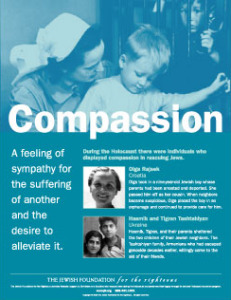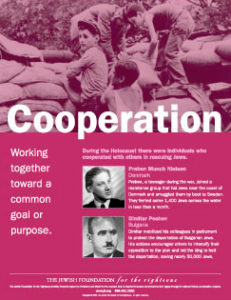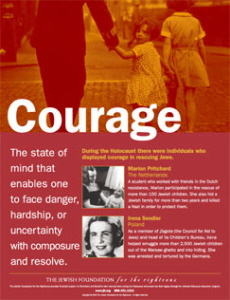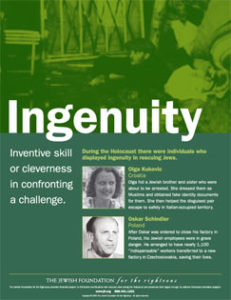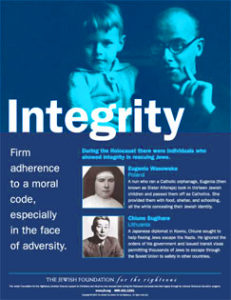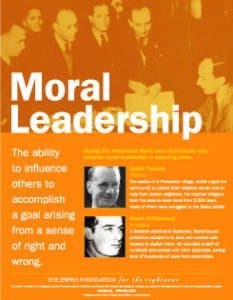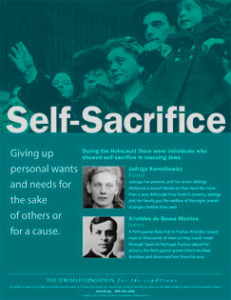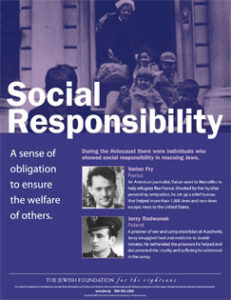Resources
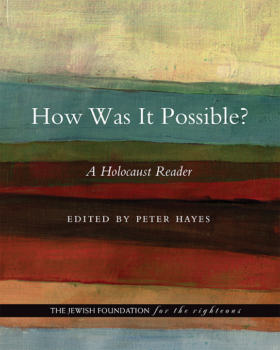
How Was It Possible?: A Holocaust Reader
As the Holocaust passes out of living memory, future generations will no longer come face-to-face with Holocaust survivors. But the lessons of that terrible period in history are too important to let slip past. How Was It Possible?, edited and introduced by Peter Hayes, provides teachers and students with a comprehensive resource about the Nazi persecution of Jews. Deliberately resisting the reflexive urge to dismiss the topic as too horrible to be understood intellectually or emotionally, the anthology sets out to provide answers to questions that may otherwise defy comprehension.
This anthology is organized around key issues of the Holocaust, from the historical context for antisemitism to the impediments to escaping Nazi Germany, and from the logistics of the death camps and the carrying out of genocide to the subsequent struggles of the displaced survivors in the aftermath.
Prepared in cooperation with the Jewish Foundation for the Righteous, this anthology includes contributions from such luminaries as Jean Ancel, Saul Friedlander, Tony Judt, Alan Kraut, Primo Levi, Robert Proctor, Richard Rhodes, Timothy Snyder, and Susan Zuccotti. Taken together, the selections make the ineffable fathomable and demystify the barbarism underlying the tragedy, inviting readers to learn precisely how the Holocaust was, in fact, possible.
Click here for more information.

Poster Set on Rescue: Traits that Transcend
The Jewish Foundation for the Righteous offers a set of classroom posters on the rescue of Jews by non-Jews during the Holocaust. This set conveys a crucial message: that the Righteous are not just heroes from the past, but also role models for the present. The posters underscore this idea by linking individual rescuers to character traits exemplified in their stories – traits that are well-known and within reach to young people.
The JFR poster set on rescue is being used in classrooms and Holocaust centers across the country and abroad. The poster set has been published in Croatian and Polish and is being used in secondary schools in both countries. We are pleased to offer this unique educational resource. The handouts are needed if you are using the suggested approaches from the Teachers’ Guide that accompanied your poster set.
We no longer have poster sets available.
If you already have the posters and would like to download the handouts, please click here. The handouts are needed if you are using the suggested approaches from the Teachers’ Guide that accompanied your poster set.
WHY TRAITS THAT TRANSCEND?
By exhibiting these traits in their efforts to save Jews, ordinary people transcended their own limitations and the obstacles that stood in their paths.
By affirming the potential they have to show courage or ingenuity or self-sacrifice in their own lives, students will realize that these traits transcend the confines of history.
Links
America and The Holocaust
This website is based on the PBS documentary, “America and the Holocaust,” a part of the “The American Experience” series. The film is about America’s controversial involvement in World War II and the Holocaust. The site offers primary source documents, a program description, transcripts of the film narration, a teachers’ guide, and links on the subject.
Anne Frank House
This website offers information about Anne Frank, the house in which she hid, and the diary she kept while in hiding. Included are reactions to the diary from her father, Otto Frank.
Anne Frank Online
This website is sponsored by the Anne Frank Center USA. The site offers information about Anne Frank as a young girl and about the Center. Educational materials and resources are available.
Association of Holocaust Organizations
This website provides information on the AHO, a network of Holocaust organizations throughout the U.S. and the world. The site includes a list of member organizations and links to their websites.
The Auschwitz Jewish Center Foundation
This website provides information on the AHO, a network of Holocaust organizations throughout the U.S. and the world. The site includes a list of member organizations and links to their websites.
Auschwitz Birkenau Memorial and Museum
This website contains information about the museum as well as the role of Auschwitz during the Holocaust. It also offers teachers and students educational sources for learning more about the Shoah.
The Avalon Project at the Yale Law School: The Nuremberg Trials
The Nuremberg Trials website gives the visitor access to vital documents relating to the Nuremberg Trials.
The Buchenwald and Mittlebau-Dora Memorials Foundation
The website contains information about the history of the museum and memorial site, and offers education resources for students and teachers concerning the Holocaust.
Conference on Jewish Material Claims Against Germany
The website provides information on Holocaust restitution, funding programs for Holocaust survivors, and resources for other Holocaust related organizations and non-profits.
Dachau Concentration Camp Memorial Site
This website discusses the history of the Dachau concentration camp from its establishment to liberation.
Fortunoff Video Archive for Holocaust Testimonies
This website offers information about the archive at Yale University that has a collection of over 3,800 videotaped interviews with witnesses and survivors of the Holocaust. Also included is a catalog and research guide to the archive and a list of edited video programs available for loan to schools and community groups.
Galicia Jewish Museum
The Galicia Jewish Museum’s website includes information about exhibitions, events, and educational programs at the museum, which is located in Krakow, Poland. The main exhibition relates the history of Jewish culture and civilization in Poland through contemporary photographs.
Ghetto Fighters’ House: Holocaust and Jewish Resistance Heritage Museum
The Ghetto Fighters’ House: Holocaust and Jewish Resistance Heritage Museum’s website contains information about the museum located in Western Galilee, Israel. Along with information about the museum, there is also access to the library, archives and the Museum’s education program.
House of the Wannsee Conference
This website discusses the Wannsee Conference and provides documents from it.
Jewish Partisan Educational Foundation
This website tells the story of Jewish partisans who fought back against the Nazis. It contains video-based interviews with Jewish partisans, study guides, and other educational materials.
The Jewish Virtual Library
This website offers information and resources on Jewish history ranging from the Holocaust to Israel-US relations, using sources such as statistics, primary source documents, and maps.
Memorial de la Shoah
This website contains information regarding the history of the Holocaust, including timelines, maps, an encyclopedia, filmographies, and reference texts. It also contains information for teachers, including pedagogical activities, lesson plans, and training sessions.
The Museum of Jewish Heritage: A Living Memorial to the Holocaust
This website contains resources on Jewish history, tradition, and culture, encompassing Jewish life before the Holocaust, during the Holocaust and after the Holocaust. The website also contains educational material including online curricula, online exhibitions, and exhibit information and context.
The Righteous Gentiles from PBS’s Frontline Program: Shtetl
This website is devoted to those non-Jews who risked their lives to save Jews during the Holocaust. The site includes five oral histories, biographies, and photographs of rescuers. Also included is information on Polish-Jewish relations during the Holocaust, information on the Treblinka concentration camp, and classroom activities for teachers.
The Simon Wiesenthal Center
This website offers information on the Center’s Museum of Tolerance located in Los Angeles. Information about Simon Wiesenthal and the Center’s education program is also included.
The United States Holocaust Memorial Museum
The United States Holocaust Memorial Museum’s website provides comprehensive information about the museum and the history of the Holocaust. Included on the site is a historical overview of the Holocaust, educational information, an annotated videography, a photo archive, and a comprehensive listing of Holocaust organizations associated with the museum.
USC Shoah Foundation Institute
This is the USC Shoah Foundation Institute’s website. The Shoah Foundation is dedicated to interviewing and archiving the testimonies of survivors, rescuers, and liberators of the Holocaust. It provides access to IWitness, the online application that enables educators and students to search, watch, and learn from more than 1,000 video testimonies of Holocaust survivors and other witnesses.
Yad Vashem
Yad Vashem’s website, sponsored by the Holocaust Martyrs and Heroes Remembrance Authority in Jerusalem, Israel, offers information about events at Yad Vashem and how one can access information from the museum’s photo and film archives. Information is also provided about Yad Vashem’s Holocaust education program for school children.
YIVO
The website contains sources for information pertaining to Eastern European Jewish culture, language, and history. Online exhibitions contain documentation and archival holdings on Jewish History, the Holocaust period, the experience of immigration to the United States, antisemitism,; and the continuing influence of Ashkenazic Jewish culture today.




